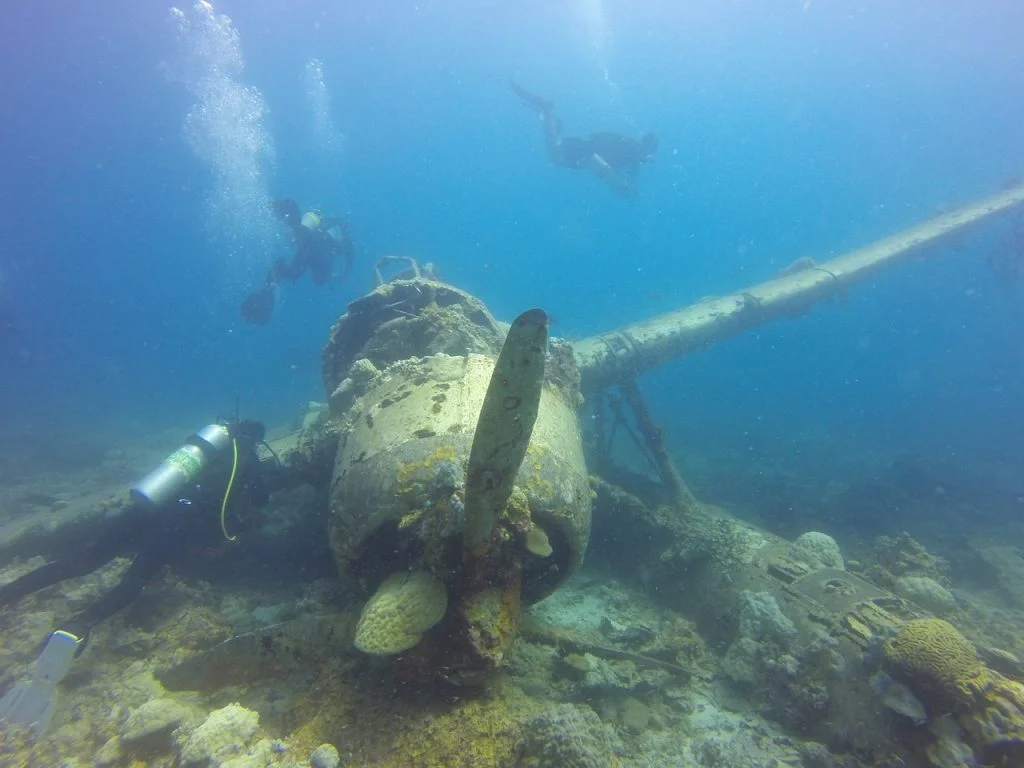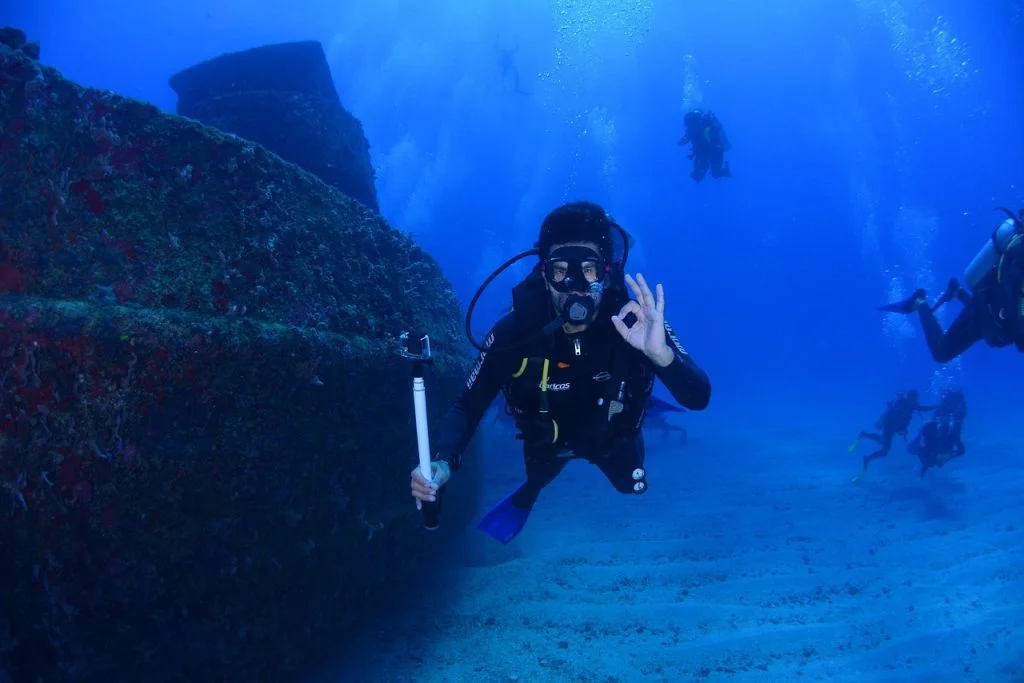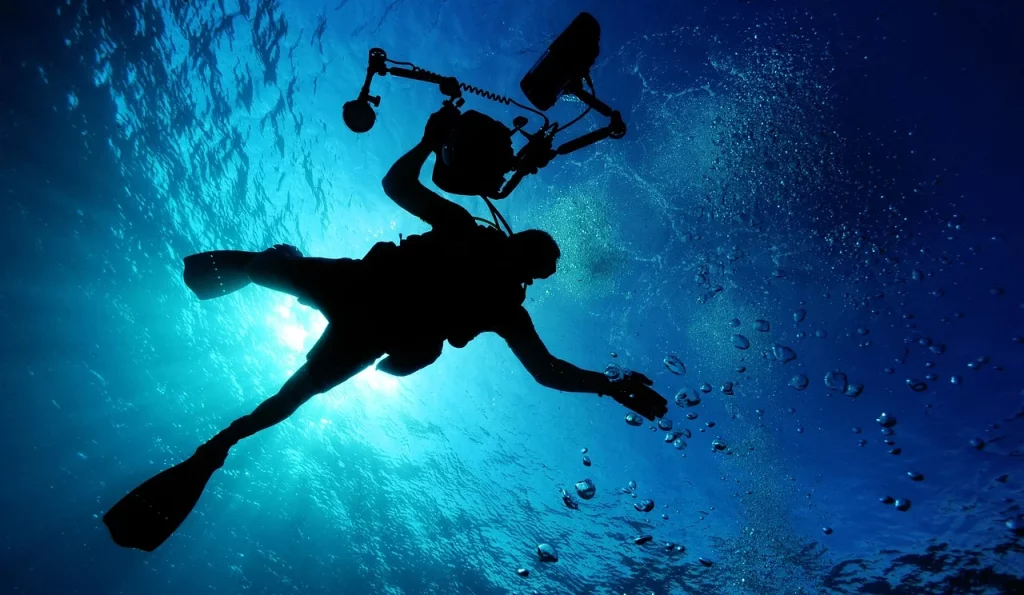Have you tried explaining to a clownfish that you’re not an anemone? Spoiler alert: it’s a one-sided conversation. That’s just one of the moments from my years exploring the ocean’s depths. Scuba diving isn’t just a hobby; it’s an adventure in fish diplomacy and mastering the art of not inhaling while laughing underwater. Ever laughed with a mouthful of seawater? I don’t recommend it.
But what I do recommend is to read these 50 epic scuba diving facts. From the mysterious to the outright bizarre, my underwater journeys have revealed truths stranger than fiction. Ready to dive in and learn why sea turtles are the hipsters of the ocean?
The sea, once it casts its spell, holds one in its net of wonder forever.
Jacques Cousteau
Scuba Diving Facts
Dive into the depths of knowledge with these fascinating facts about scuba diving. Remember, there’s a quiz at the end, so stay sharp and focused!
- Scuba stands for Self-Contained Underwater Breathing Apparatus.
- The first successful scuba system was developed by Jacques-Yves Cousteau and Émile Gagnan in 1943.
- Scuba diving allows for freedom of movement underwater, unlike surface-supplied diving.
- The maximum depth for recreational scuba diving is generally limited to 40 meters (130 feet).
- The bends, or decompression sickness, is a risk in scuba diving caused by the formation of nitrogen bubbles in the blood.
- Pre-dive safety checks are crucial to ensure all equipment is functioning properly.
- Scuba divers use a buoyancy control device (BCD) to maintain neutral buoyancy underwater.
- Underwater navigation is often performed with a compass and natural landmarks.
- Enriched air nitrox is a popular breathing gas mix, allowing longer bottom times.
- Visibility underwater can vary greatly, depending on location and weather conditions.
- Marine life encountered varies widely, from tiny plankton to large whales.
- Scuba diving can be done in various environments, including oceans, lakes, rivers, and caves.
- Wetsuits and drysuits are used to conserve body heat in cold water.

- A dive computer is used to monitor depth, bottom time, and decompression status.
- Underwater communication is usually done through hand signals.
- Scuba diving requires a certification, with the most common being from PADI or NAUI.
- Overhead environments like caves and wrecks pose additional risks for divers.
- Scuba tanks are typically filled with compressed air, but sometimes with other gas mixes.
- Barotrauma is an injury caused by pressure changes, affecting ears and sinuses.
- Many divers use underwater cameras to capture the marine environment.
- Night diving offers a different perspective, with some marine life being more active.
- Scuba divers must learn how to manage their air supply to avoid running out underwater.
- Conservation efforts are important in scuba diving to protect marine ecosystems.
- Drift diving is a technique where divers are carried by the current.
- The dive flag indicates divers are in the water, and boats should keep their distance.
- Dive planning is crucial, including depth, time, and gas management.
- Snorkeling is often practiced as a simpler alternative to scuba diving.
- Scuba diving can lead to the discovery of shipwrecks and underwater ruins.

- Hyperbaric chambers are used to treat decompression sickness.
- Freediving is a form of underwater diving that relies on breath-holding.
- Underwater photography is a popular hobby among scuba divers.
- Technical diving goes beyond recreational limits and involves special training and equipment.
- Rebreathers recycle the diver’s exhaled gases, allowing for longer dives.
- Depth and time affect the absorption of nitrogen by the body.
- Scuba diving can be used for scientific research and marine biology studies.
- Ice diving is a type of diving under ice that requires special procedures.
- Many marine animals are accustomed to divers and not easily startled.
- Dive resorts offer packages specifically for scuba divers.
- Scuba diving requires continuous education and practice to maintain safety and skill.

- Dive computers have revolutionized how divers plan and execute dives.
- Underwater caves can be explored by specially trained cave divers.
- Rescue Diver courses train divers in emergency response and management.
- Underwater archaeology often involves scuba diving to explore submerged sites.
- Altitude diving in high-altitude lakes requires special decompression procedures.
- Scuba diving tourism is a significant industry in many coastal regions.
- Dive lights are essential for night and wreck diving for visibility.
- Neutral buoyancy is a key skill, allowing divers to hover without touching the bottom.
- Scuba diving can be physically demanding and requires good health and fitness.
- Dive tables were traditionally used to plan decompression times before dive computers.
- Scuba diving has a community culture, often with clubs and social events.
Scuba Diving Myths

Having explored all these fun facts about scuba diving, it’s time to navigate through the murky waters of myths around the topic and discover what the real truth is behind them.
- Scuba Diving is Extremely Dangerous
While scuba diving, like any sport, has its risks, it’s generally safe if you follow proper training and guidelines. Most accidents occur due to diver error or ignoring safety procedures. With appropriate training and adherence to safety rules, diving can be a very safe activity. - You Have to Be an Excellent Swimmer to Dive
You don’t need to be an Olympic swimmer to enjoy scuba diving. Basic swimming skills and comfort in the water are enough. Dive training courses are designed to accommodate varying skill levels, ensuring everyone can learn at their own pace. - Diving is Only for Young, Fit People
Scuba diving is a diverse and inclusive activity, welcoming individuals of various ages and fitness levels. As long as you’re in reasonable health and have clearance from a doctor if necessary, you can dive. Many people enjoy diving well into their senior years! - Sharks and Marine Creatures Are a Major Threat
Hollywood might have us believe sharks are a diver’s biggest fear, but in reality, shark attacks are extremely rare. Most marine creatures are harmless and are more afraid of you than you are of them. Respectful interaction with wildlife makes diving a harmonious experience. - Diving is Too Expensive for the Average Person
While there are costs associated with scuba diving, like any hobby, it doesn’t have to break the bank. Many dive shops offer rental equipment, and there are various price points for courses and trips. With a bit of planning and budgeting, diving can be accessible and affordable.
No products found.
Scuba Diving Quotes

Why did the scuba diver quit his job? Because it had too much pressure. When you stop laughing because of my great pun, you can enjoy five of my favorite quotes about scuba diving.
Scuba diving is sensual. To breathe underwater is one of the most fascinating and peculiar sensations imaginable.
Tec Clark
Tec Clark, a renowned scuba diving expert and educator, describes the unique and captivating experience of breathing underwater.
Every time I slip into the ocean, it’s like going home.
Sylvia Earle
Sylvia Earle, a famous marine biologist and oceanographer, expresses her deep connection and sense of belonging to the ocean.
From birth, man carries the weight of gravity on his shoulders. He is bolted to earth. But man has only to sink beneath the surface and he is free.
Jacques Cousteau
Another profound observation by Jacques Cousteau, highlighting the liberating experience of scuba diving as an escape from the gravitational constraints of land.
The best way to observe a fish is to become a fish.
Jacques Cousteau
Jacques Cousteau encapsulates the immersive nature of scuba diving, suggesting that to truly understand marine life, one must experience their environment firsthand.
Underwater, man becomes an archangel.
Jacques Mayol
Jacques Mayol, a legendary free diver, conveys the transformative experience of being underwater, where humans can feel otherworldly and liberated.
Scuba Diving FAQ

After exploring the depths of wisdom in these scuba diving quotes, let’s anchor ourselves in the FAQ section. Pay close attention; these insights might just be your lifeline in the scuba diving test that follows.
- Is Scuba Diving Dangerous?
While scuba diving has risks, it’s generally safe with proper training and adherence to safety rules. Most issues arise from neglecting safety procedures or due to health problems. - What is the Deepest Scuba Dive Ever?
Ahmed Gabr holds the record for the deepest scuba dive at 332.35 meters (1,090 feet, 4.5 inches), achieved in 2014 in the Red Sea, Egypt. - What is Free Diving?
Free diving involves diving without a breathing apparatus, relying on holding one’s breath. It requires training in breath-holding and efficient oxygen usage. - What Does SCUBA Stand For?
SCUBA stands for Self-Contained Underwater Breathing Apparatus, referring to the gear that allows breathing underwater using a compressed air tank. - Is Scuba Diving Hard?
Scuba diving can be challenging for beginners but becomes enjoyable with training. It involves learning to use diving equipment and becoming comfortable.
No products found.
Scuba Diving Trivia

Are you ready to test your scuba knowledge? If you don’t score any points, I’ll have to send a clownfish to teach you the basics again!
Conclusion
So, we’ve dived deep (pun intended!) into the fascinating world of scuba diving. From the mysterious depths of the ocean to the epic behaviors of its inhabitants, it’s been quite the underwater adventure. But let’s be real – how many of us were just imagining being a mermaid or Aquaman?
Remember, the ocean is as vast as our curiosity, but always respect its boundaries. Now, I have to ask: If you could talk to one sea creature while scuba diving, what would it be, and what would you ask? Let me know in the comments.
4 Sources Used For This ArticleDon’t Believe These 10 Scuba Diving Myths – Scuba Dobedo
100 Best Diver Quotes – Kidadl
110 Best Scuba Diving Quotes – Travel With Mansoureh


